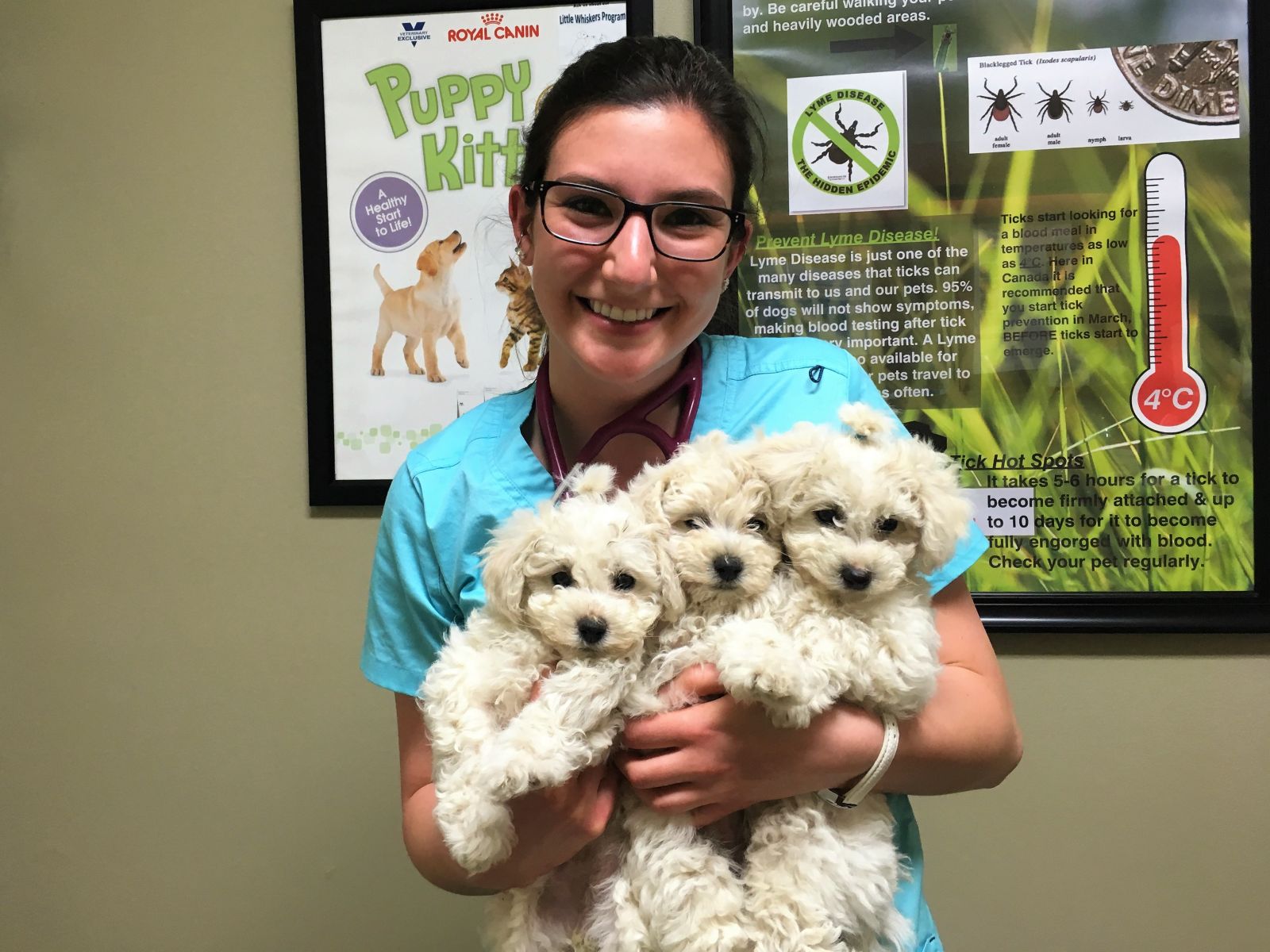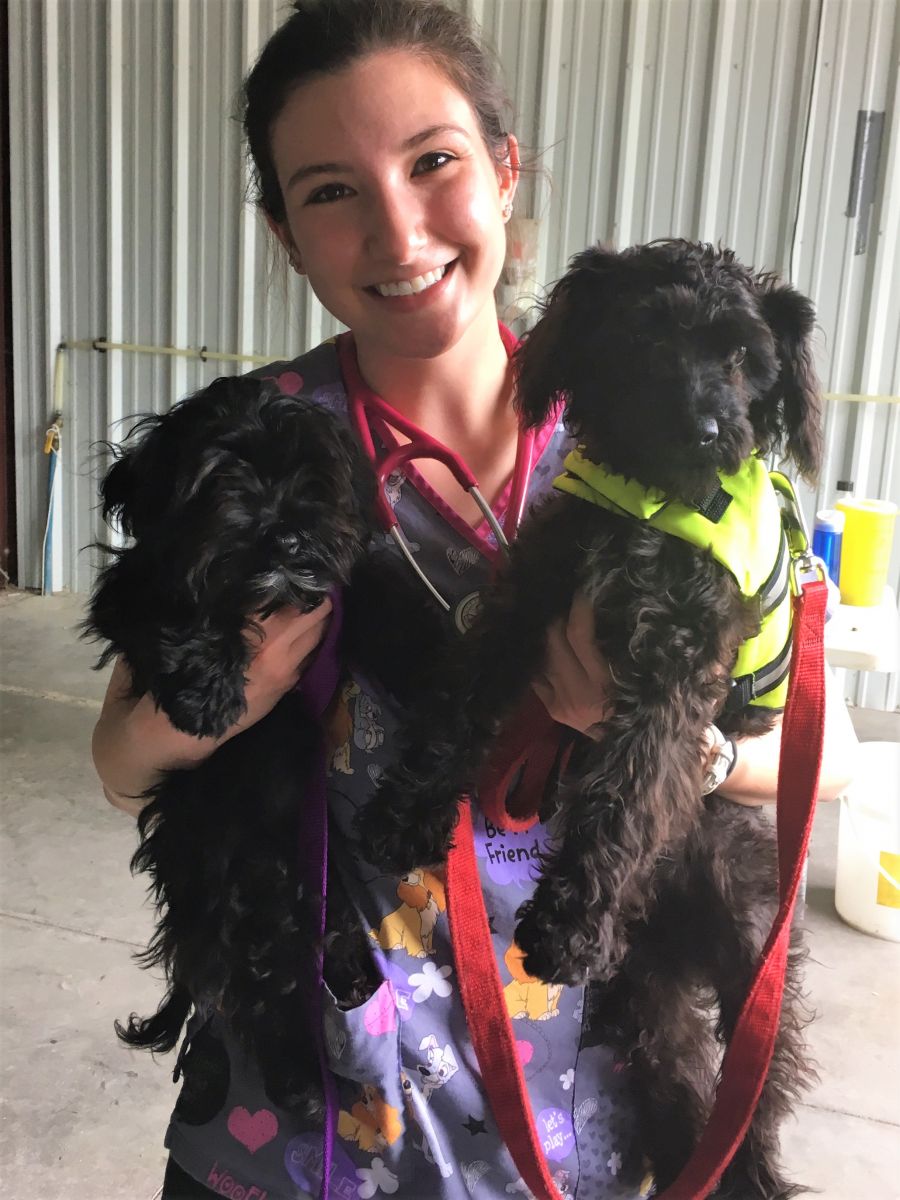Puppy appointments are always my favourite part of the day! At the clinic we are very grateful when breeders and pet owners bring their puppies in to be assessed for any health problems and started on a preventative medicine plan. Veterinary care should begin right at the beginning of puppyhood with regular deworming and implementation of vaccines. Due to their age and immature immune systems, puppies have a higher risk than adults for developing certain life threatening diseases. It is recommended that vaccine protocols begin at eight weeks of age in all puppies. The core vaccines (DAPP = Distemper, Adenovirus, Parvovirus, Parainfluenza) are administered in a series of three boosters over three to four week intervals. Ideally, puppies will be coming into the clinic to be vaccinated at 8, 12 and 16 weeks of age for their core vaccines. Rabies is a mandatory vaccine that must be administered once a puppy is older than 12 weeks of age. The DAPP and rabies vaccines are administered again at one year of age, and subsequently every three years after that. Leptospirosis, a disease acquired from the urine of wildlife and contaminated water, is on the rise in dog populations and is now considered to be a core vaccine in most regions. It also requires an initial series of two vaccines three to four weeks apart.

In addition to my externship I volunteered multiple weekends in May at community outreach low-cost wellness clinics. Since Phase 1, I have enjoyed volunteering at community outreach clinics to gain hands-on experience in client communication and preventative medicine. I have contributed to at least a dozen community outreach clinics during my time at OVC and love helping clients and pets receive veterinary care that they otherwise would not be able to afford. Of all the clinics that I have worked at, my favourites have been my time spent at the Six Nations Reserve in Ohsweken, Ontario. As a Phase 4 student I have the ability to run my own stations, which means I am in charge of going through each patient’s medical records to determine which vaccines they are needed during the appointment, performing full physical examinations, administering all vaccines and microchips, and dispensing deworming products.
 Ohsweken is right in the middle of the Caledonia area which has the highest prevalence of heartworm positive dogs in Ontario. Heartworm is a parasite that is transmitted by mosquitoes and instead of establishing infection in the gastrointestinal tracts like many other worms it manifests in the bloodstream, eventually making its way to the heart and lungs. In addition to vaccinating puppies that come to the community outreach clinic, it is recommended that every puppy is started on heartworm preventatives as soon as they reach two months of age. There are different formulations of heartworm preventative medication, such as injectable, topical and oral, and it is important that the right formulation is dispensed for each puppy based on age and safety. More than 100 dogs are diagnosed with heartworm each year in the Caledonia area, which is why annual blood testing for disease and dispensing preventatives is vital at these community outreach clinics. Over the past 10 years, since the implementation of these community outreach clinics, the incidence of heartworm has been significantly reduced on the reserve.
Ohsweken is right in the middle of the Caledonia area which has the highest prevalence of heartworm positive dogs in Ontario. Heartworm is a parasite that is transmitted by mosquitoes and instead of establishing infection in the gastrointestinal tracts like many other worms it manifests in the bloodstream, eventually making its way to the heart and lungs. In addition to vaccinating puppies that come to the community outreach clinic, it is recommended that every puppy is started on heartworm preventatives as soon as they reach two months of age. There are different formulations of heartworm preventative medication, such as injectable, topical and oral, and it is important that the right formulation is dispensed for each puppy based on age and safety. More than 100 dogs are diagnosed with heartworm each year in the Caledonia area, which is why annual blood testing for disease and dispensing preventatives is vital at these community outreach clinics. Over the past 10 years, since the implementation of these community outreach clinics, the incidence of heartworm has been significantly reduced on the reserve.
These pups were two of the 150 dogs cared for at this clinic, and I consider myself very fortunate to have the opportunity to help puppies like them start off their puppyhoods on the right foot (or paw)!
